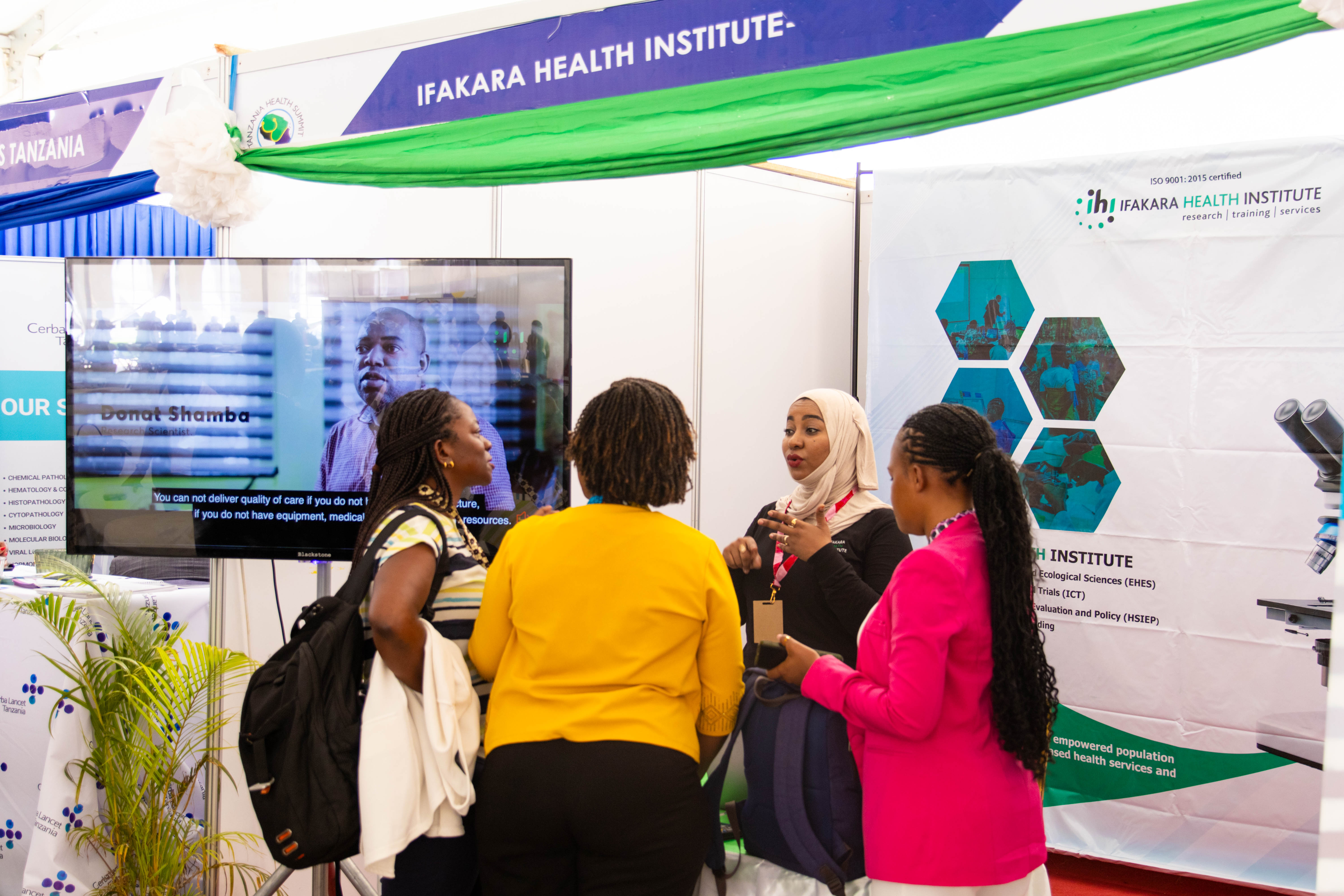
#THS2024: Ifakara “igniting progress” at Tanzania Health Summit 2024!

The 11th Annual Tanzania Health Summit took place in Zanzibar, Tanzania, from October 1-3, 2024. Themed "Igniting Progress: Joining Efforts for Quality Healthcare through Public-Private Partnerships," the summit attracted 1,500 participants, with Zanzibar's President Hussein Ally Mwinyi as guest of honor.
This platform brought together healthcare leaders and institutions to discuss innovations and partnerships essential for improving the country’s healthcare landscape. The focus was on how public and private sector collaboration could drive quality healthcare services in Tanzania.
Ifakara’s Strong Representation
Ifakara Health Institute played a key role at the summit, with Chief Executive Director Dr. Honorati Masanja leading a delegation of scientists. Eight researchers from the Institute presented pivotal studies covering a wide array of topics.
Justina Maganga presented research on social determinants of physical inactivity and unhealthy diets among adolescents living with HIV in Ifakara Town. Her study identified lifestyle challenges these young individuals faced and suggested pathways for improving their health and wellbeing.
Jilly Mseti discussed how temperature, mosquito feeding status, and mosquito density influenced the efficacy of insecticide-treated nets, providing crucial insights for enhancing malaria control strategies.
Insights on Malaria, Mosquito Control
Lina Finda addressed the topic of gene drives for malaria control, focusing on the recommendations of key African stakeholders. This emerging technology could play a significant role in malaria elimination efforts, and her presentation offered a detailed look into its potential impact and ethical considerations.
Sperancia Coelestine explored the competition between larvae of Aedes aegypti and African malaria vectors, presenting findings from a semi-field system in Tanzania. This research offered new data that could inform the ecological management of vector populations.
Improving Maternal and Neonatal Health
Esther Elisaria presented results from the Connect Project, which worked towards scalable approaches for improving reproductive, maternal, newborn, and child health services in Dodoma. Her study highlighted the benefits of community-based interventions for first-time mothers.
Jitihada Baraka’s presentation delved into healthcare providers' and parents' perceptions of CPAP treatment for newborns, crucial for improving survival rates. Her research pointed toward the benefits of CPAP therapy for neonatal care in Tanzania.
Technology-Driven Solutions
Josephat Mutakyamilwa presented on mentorship programs that enhanced newborn care coverage in Dar es Salaam, Mbeya, and Kilimanjaro. His findings advocated for consistent training to maintain high-quality neonatal care.
Finally, Irabi Kassim introduced a machine learning approach for forecasting CPAP demand in healthcare facilities. His innovative use of technology demonstrated how predictive models could optimize healthcare resources and improve outcomes.
Showcasing Innovation at the Exhibition Booths
In addition to the scientific presentations, Ifakara Health Institute had an exhibition booth showcasing its research efforts. The NEST360 program, implemented by the Institute and its partners, also had a dedicated booth to highlight tools designed to improve neonatal care.
This year’s summit showcased the depth of research and innovative solutions emerging from Ifakara Health Institute, underscoring the critical role that science and technology play in driving healthcare progress in Tanzania.
Day 2: End Malaria Council Secretary Visits Ifakara, NEST360 Booths
On day two of the THS, the Ifakara Health Institute booth welcomed a special visitor—Adiel Mushi, Secretary of the End Malaria Council and also a representative from ALMA. His visit underscored the growing collaboration between key players in the fight against malaria.
During his visit, Mushi engaged with Ifakara researchers, Sheikha Salum and Dr. Deborah Sumari, to discuss the Institute’s latest advancements in malaria control and prevention. This interaction highlighted the shared commitment to accelerating progress towards malaria elimination in Tanzania and beyond, showcasing the vital role of partnerships in achieving impactful health outcomes.
Day 2: USAID Tanzania Deputy Director Visits Ifakara Booth
The Ifakara Health Institute booth at the Tanzania Health Summit had the honor of welcoming USAID Tanzania Deputy Director Alex Klaits. During the visit, Klaits was briefed on Ifakara’s wide range of groundbreaking interventions and projects, showcasing the Institute’s impactful work in areas such as malaria control, clinical trials, and health systems strengthening.
The visit – from a key partner in public health research and program implementation – provided a platform to highlight Ifakara’s innovative approaches in improving public health outcomes and fostering long-term, sustainable solutions for communities across Tanzania.
USAID is a longstanding partner to Ifakara, having supported the Institute to generate evidence and transform Tanzanians’ lives over the years. One of the latest funding initiatives through the President’s Malaria Initiative (PMI) is the PMI Shinda (Defeat) Malaria project (2023-2027), which seeks to support the Government of Tanzania towards malaria elimination.
